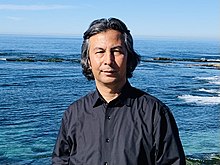
Age, Biography and Wiki
Tahir Hamut Izgil was born on 1969 in Kashgar, Xinjiang, is a poet. Discover Tahir Hamut Izgil’s Biography, Age, Height, Physical Stats, Dating/Affairs, Family and career updates. Learn How rich is He in this year and how He spends money? Also learn how He earned most of networth at the age of 54 years old?
| Popular As | N/A |
| Occupation | Poet, filmmaker, and activist |
| Age | 54 years old |
| Zodiac Sign | |
| Born | 1969, 1969 |
| Birthday | 1969 |
| Birthplace | Kashgar, Xinjiang |
| Nationality | United States |
We recommend you to check the complete list of Famous People born on 1969.
He is a member of famous poet with the age 54 years old group.
Tahir Hamut Izgil Height, Weight & Measurements
At 54 years old, Tahir Hamut Izgil height not available right now. We will update Tahir Hamut Izgil’s Height, weight, Body Measurements, Eye Color, Hair Color, Shoe & Dress size soon as possible.
| Physical Status | |
|---|---|
| Height | Not Available |
| Weight | Not Available |
| Body Measurements | Not Available |
| Eye Color | Not Available |
| Hair Color | Not Available |
Who Is Tahir Hamut Izgil’s Wife?
His wife is Marhaba Izgil
| Family | |
|---|---|
| Parents | Not Available |
| Wife | Marhaba Izgil |
| Sibling | Not Available |
| Children | 3 |
Tahir Hamut Izgil Net Worth
His net worth has been growing significantly in 2022-2023. So, how much is Tahir Hamut Izgil worth at the age of 54 years old? Tahir Hamut Izgil’s income source is mostly from being a successful poet. He is from United States. We have estimated
Tahir Hamut Izgil’s net worth
, money, salary, income, and assets.
| Net Worth in 2023 | $1 Million – $5 Million |
| Salary in 2023 | Under Review |
| Net Worth in 2022 | Pending |
| Salary in 2022 | Under Review |
| House | Not Available |
| Cars | Not Available |
| Source of Income | poet |
Tahir Hamut Izgil Social Network
| Wikipedia | |
| Imdb |
